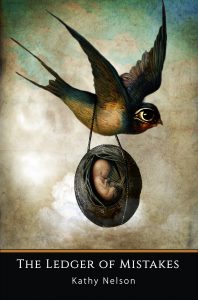Kathy Nelson: Review by Juditha Dowd

Kathy Nelson, The Ledger of Mistakes (Terrapin Books)
A ledger is an account. It records, keeps track, keeps score. In Kathy Nelson’s remarkable collection, The Ledger of Mistakes, a mother’s descent into dementia is the thread that connects the poet’s meticulous entries, which together form an underlying narrative divided into five sections.
Nelson’s mining of past events, some ordinary and others life-changing, provides a layered view of complicated relationships. Employing one of the book’s most successful themes, she draws on Jung’s psychosexual theories and the Greek myth of Electra to depict a daughter competing with her mother for a father’s love, her righteous grief when the mother quickly remarries after his death. “Rivals” recounts the experience of finding her father dead at home.
My mother never forgave me for being
the one who knelt beside my father,
my ear pressed, listening for his heart.
The list—the blanket, the ambulance—
all I could have done and did not—
hissed from her lips…
Blamed and excoriated, the innocent girl finds comfort beside a window, “…the hushed curtains hanging, the slant of evening / falling across the wall, so soundless, inert….” And the music of these lines is itself a kind of refuge. Yet the mother can be affectionate, too, even charming, an unpredictable figure who keeps the daughter off-kilter but engaged.
Snakes weave through many of these poems, especially copperheads, indigenous to the Appalachians where Nelson grew up. They appear suddenly or wait out of sight, gorgeous and deadly. The snake is a slippery symbol here, inviting comparisons the poet alternately embraces and resists, permitting the creature its own existence even as it embodies other meanings. The poem entitled “Snakes” reveals they have long been a family’s preoccupation.
…The ancestral birthplace under the porch:
coppery length along the driveway,
sine wave on asphalt,
looped form under the ferns. The fantasy
of safety. The story he told—cotton field,
bag heavy on his shoulder, looking down
between his feet: the coil…
The copperhead even makes an appearance as the now-deceased mother, a startling but apt substitution that captures the mixture of fear, longing and fascination the daughter still struggles to parse “… I know / her because I can’t take my eyes off her. / I watch with that same stitch at my sternum— / if I clear my mind of fear, we might / reconcile….”
One of Nelson’s gifts is the ability to slip seamlessly between analysis and emotion, while maintaining tension between the two. Poetic forms are used to good effect, particularly the pantoum, its repetitions well-suited to grief. In later poems, the daughter—now wife, mother and grandmother—calls up old memories and dreams, seeking fresh insight. Still tender toward the child she once was, her grown-up self faces her mother’s decline with love and forbearance, even as she craves approval that will not be forthcoming. Of a visit with her mother at the Gerontology-Psychiatric Unit she writes,
When I slid alongside her, we were like feuding neighbors
gazing up at the eclipsed moon, forgetting all of it
under the blazing darkness. I loved my mother’s astonishment
then, and her curious regard—a baby’s—at such intimacy
with a stranger. And because I knew she’d been disarmed,
I loved enfolding her, as though after a long absence…
In the fifth section we find the daughter now residing elsewhere, surrounded by family, in circumstances so happy she finds them almost unbelievable after so much sorrow. The final poem, “Lunaria,” takes its name from the native plant familiarly known as “honesty.” Nelson re-explores a visit to her mother while she’s still at her old home. The revised version of the visit, though imaginary, offers the possibility of closure and peace.
…When I arrive, she’s in the garden, as she was.
No diagnosis, no documents of surrender.
Only the smell of spring mud from the pond.
Tender buds of cattails, yellow forsythia.
She knows me—not the wrench
come to dismantle her life, but her child…
The poem in its entirety brings to satisfying conclusion a deeply felt and finely wrought collection. For this reader, at least, Nelson has found compelling answers to the question posed in the book’s stunning introductory poem—Why remember the dead?
We do it for compassion’s sake. For wisdom. For love.
Juditha Dowd’s fifth book of poetry, Audubon’s Sparrow (Rose Metal Press), is a lyric biography in the voice of Lucy Bakewell Audubon.